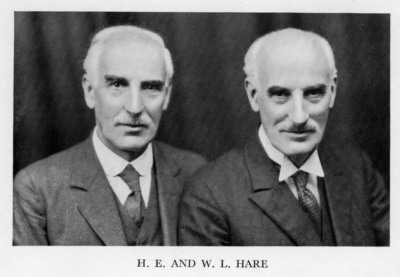William Loftus Hare
William Loftus Hare (1868-1943) was an early Theosophist and writer. He is best known as co-author with his brother Harold Edward Hare of the controversial book Who Wrote the Mahatma Letters.
The brothers were twins, born in the St. Pancras parish of London in the second quarter of 1868.[1] Their older brother Thomas owned an engraving works, and as young men they lived with Thomas and his wife.[2] In 1911, William and Harold were living in Middlesex, London, evidently unmarried. William was a "colour printer" (photo engraver) and Harold was an artist.[3]
Theosophical Society activities
Quaker activities
William became involved with the Quaker community at Derby and participated in London Annual Meeting. As editor of the Socialist Quaker Society journal Ploughshare (1912-1919), Hare "began to disseminate his wide interests in world faiths."
Parliament of Living Religions, 1924 and interfaith activities
Hare wrote an account of the "Parliament of Living Religions" that took place in London in 1924, of which he was "Joint Honorable Secretary." It was published in The Open Court. He also described the following ten objectives of such International Conferences.
- 1. To bring together in conference, for the first time in history, the leading representatives of the great Historic Religions of the world.
- 2. To show to men, in the most impressive way, what and how many important truths the various religions held and teach in common.
- 3. To promote and deepen the spirit of human brotherhood among religious men of diverse faiths, through friendly conference and mutual good understanding, while not seeking to foster the temper of indifferentism, and not striving to achieve any formal and outward unity.
- 4. To set forth, by those most competent to speak, what arc deemed the important distinctive truths held and taught by each religion, and by the various chief branches of Christendom.
- 5. To indicate the impregnable foundations of theism and the reasons for man's faith in immortality, and thus to unite and strengthen the forces which are adverse to a materialistic philosophy of the universe.
- 6. To secure from leading scholars, representing the Brahman. Buddhist, Confucian, Parsee. Mohammedan, Jewish and other faiths, and from representatives of the various churches of Christen- dom, full and accurate statements of the spiritual and other effects of the religions which they hold upon the literature, art, commerce, government, domestic and social life of the peoples among whom these faiths have prevailed.
- 7. To inquire what light each religion has afforded, or may afford, to the other religions of the world.
- 8. To set forth, for permanent record to be published to the world, an accurate and authoritative account of the present condition and outlook of religion among the leading nations of the earth.
- 9. To discover, from competent men, what light religion has to throw on the great problems of the present age, especially the important questions connected with temperance, labor, education, wealth and poverty.
- 10. To bring the nations of the earth into a more friendly fellowship, in the hope of securing permanent international peace.[4]
He was a founder of The Society for Promoting the Studies of Religions ,and became editor of the journal Religion from 1930 to 1935.[5]
Writings
Over 100 articles by or about William Loftus Hare appear in the Union Index of Theosophical Periodicals, mostly in The Occult Review and The Herald of the Star.
In addition to edition the journal Ploughshare, Hare wrote several books. These are some of his prominent writings:
- Who Wrote the Mahatma Letters: The First Thorough Examination of the Communications Alleged to Have Been Received by the Late A.P. Sinnett from Tibetan Mahatmas. London, England: Williams & Norgate, 1936. 326 pages.
- Watts: 1817-1904. London T.C. & E.C. Jack, and New York: W. A. Stokes Co, 1910. A biography of George Frederick Watts. A note says "Masterpieces in Colour, edited by T. Leman Hare" [Thomas Hare] and the title page emphasizes "Illustrated with eight reproductions in colour." Available at Internet Archive.
- Mysticism of East and West. 1927.
- "Baha'i Cause, The". The Open Court 38:12 (December, 1924), 713, 735-737. Available at Baha'i Library Online.
Notes
- ↑ England and Wales, FreeBMD Birth Index, 1837-1915
- ↑ 1891 England Census.
- ↑ 1901 Census of England and Wales and 1911 Census of England and Wales
- ↑ "William Loftus Hare, "A Parliament of Living Religions," The Open Court 38:12 (December, 1924). Available at An Account of the Parliament of Living Religions, Wembley, London 1924
- ↑ Tony Adams. "The Universal Dimension: William Loftus Hare's Pivotal Contribution to London Annual Meeting." Quaker Studies 10.2 (2006). Available at Digital Commons.
